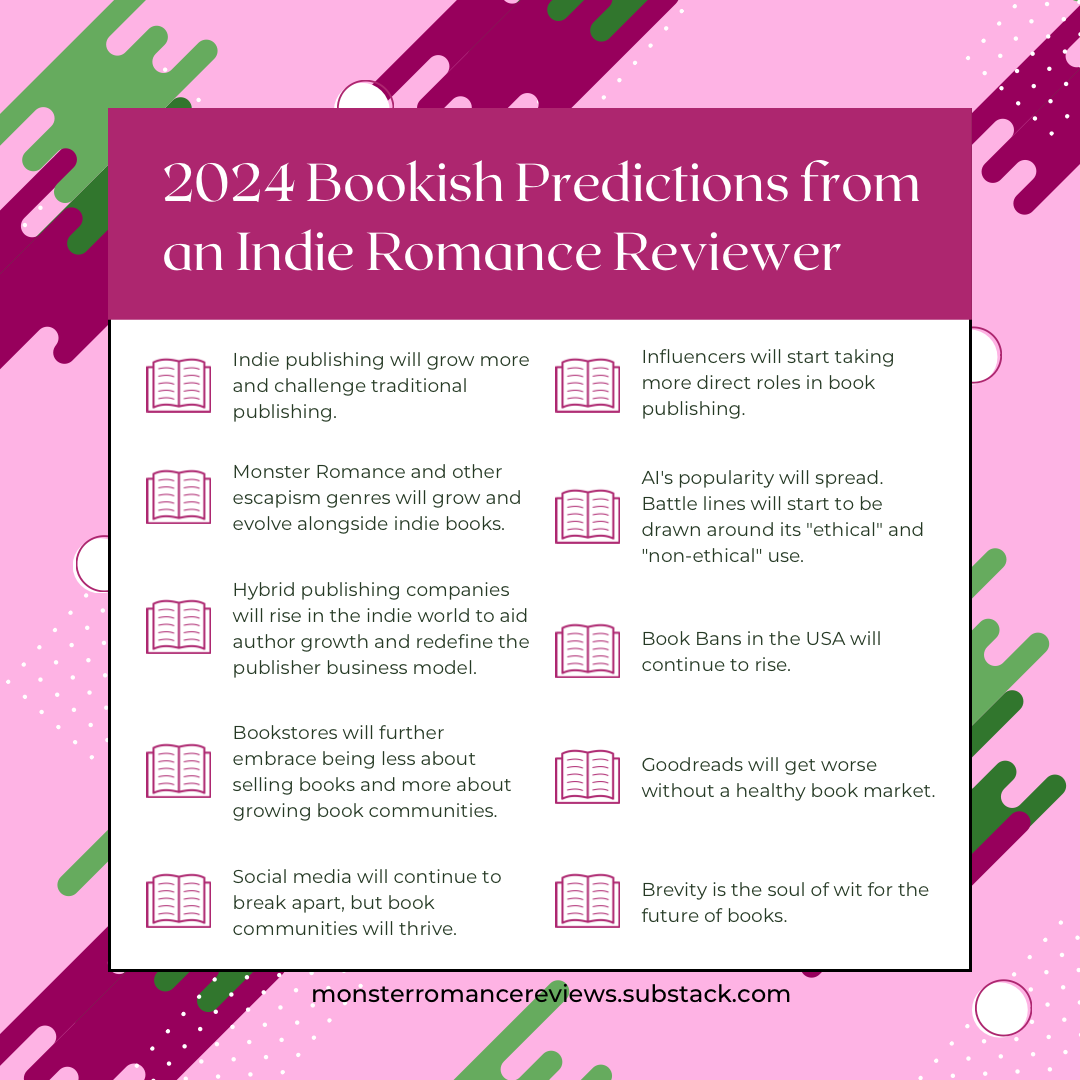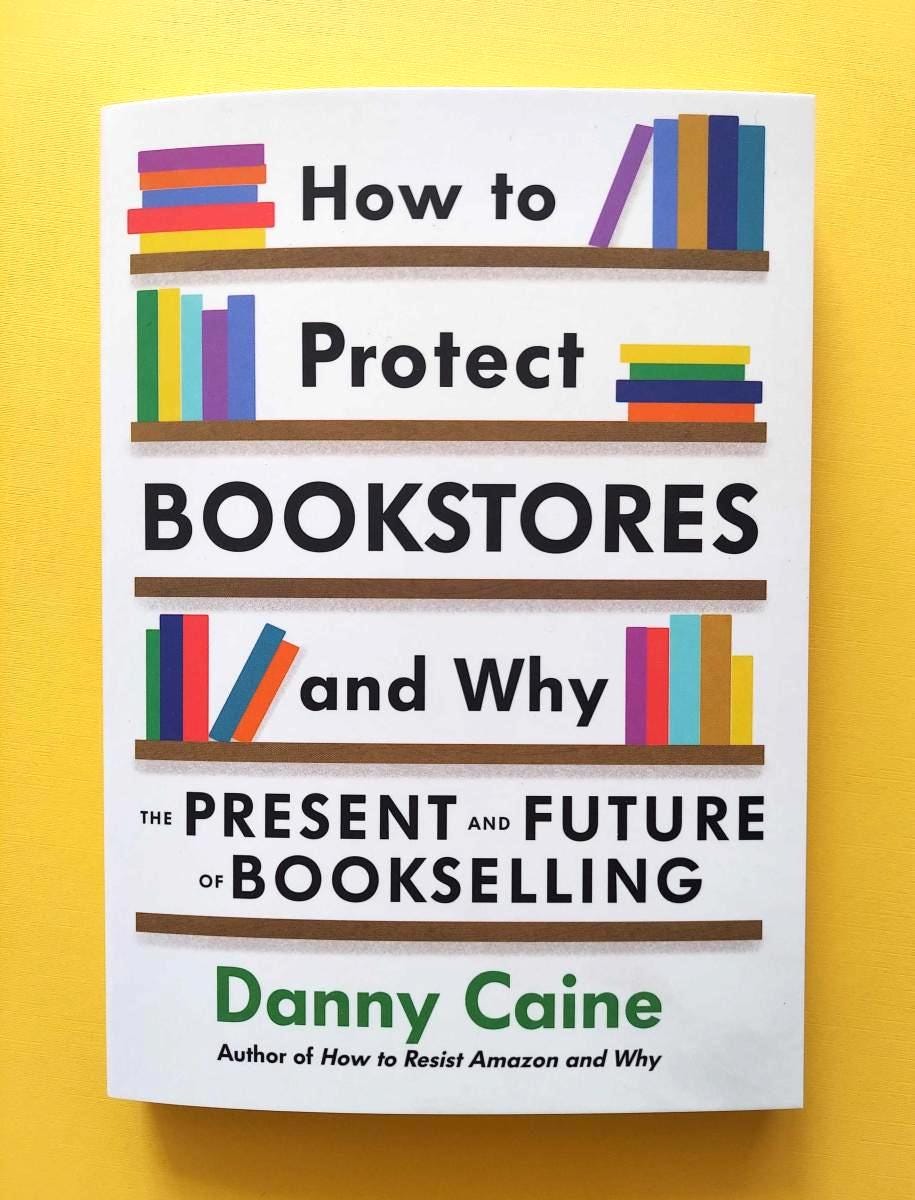Culture wars, AI, and greedy companies plagued the everyday reader and author in 2023. 2024 will have similar challenges, but the future of books is indie.
Indie publishing will grow more and challenge traditional publishing.
Smaller businesses move faster. That's well-known in the business world. Without the gates of traditional publishing and ebook platforms like KDP available to any author and paying reader, literature can experiment and evolve in unprecedented ways. The modern reader craves diversity in subject matter and characters. The indie world is the art primordial soup that readers have needed for decades. Even by the harshest of business performance indicators, profit, the independent publishing world is on the way to seriously competing with big publishers. The indie world is simply better at producing creative products of value.
To further my point, why else would they be trying to buy up printings of authors like Ruby Dixon and Kimberly Lemming? When large businesses know their market share is in danger, the classic business play to buy it back.
To be clear, this isn't an indictment against Dixon or Lemming for not being true Scotsmen or whatever. I sincerely cheer on their business success. Their success tells me that the indie world is just getting started.
Monster Romance and other escapism genres will grow and evolve alongside indie books.
I make this prediction because I am a newshound as much as an enthusiast of this book world. Which global pressure should I list for why people would want to "escape" from reality? There are just so many. Yes, please send me the sexy aliens to beam me up and away from here. I doubt I am unique in this feeling.
Genres like monster romance are pure escapism. I love it for that. I do read other stuff, and it would be cool to do a feature one day, perhaps, of excellent nonfiction I also read, like Chokepoint Capitalism. However, I am a human who likes herself and likes surviving. Monster dick helps me get through life sometimes.
Hybrid publishing companies will rise in the indie world to aid author growth and redefine the publisher business model.
A specific breed of publishers has been copping up on my Instagram feed, and its presence makes sense. These self-designated "hybrid publishers" are businesses positioned for indie authors to outsource some parts of being an all-in-one book authoring brand.
They provide many of the services a traditional publishing house has. Proofreading, editing, book design, and many more services can be found.
Here is what could be a game-changing factor. The business models of these new publishers are focused on the author as a business client. Authors maintain their IP ownership in this partnership.
Bookstores will further embrace being less about selling books and more about growing book communities.
Online book sales continue growing. Ebooks are not a fade. E-commerce is king.
That being said, readers crave community. They even desire the experience of getting a gorgeous or personally important book in person from a fellow human. In a sea of harsh reality, bookstores are an island of refuge. That is their most incredible value. You cannot just replicate it with an algorithm.
"How to Protect Bookstores and Why" by Danny Caine does a fantastic job going into this topic. I will recommend his commentary rather than drone on with my own…this time.
Social media will continue to break apart, but book communities will thrive.
X/Twitter is dying. Facebook's users are there because their great aunts are on there. I have no idea how long Instagram will hold its appeal.
There is no single platform to rule them all. Any large platform in existence can and will do whatever it wants for the sake of profit over its user experience value.
Additionally, the modern Internet user dislikes being talked to. Users seek community and connection. It is no wonder Discord is popular among indie readers. Authors can leverage this desire by building strong bases through tight, highly-engaged communities on Discord, Patreon, and small groups within platforms like Facebook Groups.
The long shot for the next chapter would be expanding book communities to the Fediverse. This evolution hinges on a scenario where Mastodon and other fediverse protocols get their public relations act together. Ironically, it might start through Threads connecting itself to the Fediverse.
I could see this because federated services allow communities to be wholly owned by their owners. For example, Smutlandia.com is fully owned by me. I can curate my users' experiences and censor whatever I want while staying connected to the greater Mastodon network as much as I want for my users. The admin of a Discord server does not have these same powers and privileges. That's a lot of power in the hands of smaller communities.
Influencers will start taking more direct roles in book publishing.
Individual content creators are taking over the functional significance of traditional booklists and professional book reviewers. Some of these influencers command enough followers who, if they each bought a book, could eventually rival Oprah's or Reese Witherspoon's book clubs. This hasn't gone unnoticed.
TikTok extending itself to have a sort of bookstore function for its creators is not outlandish. I would bet they would do it by first buying the startup, Bindry.
Bindry sells itself as a membership platform for book influencers in a fashion similar to Patreon. Those influencers can earn money from their fanbase. The influencers can use those funds towards authors their communities would like to see published and get book deals.
It is another topic to talk about this business's potential success and pitfalls. I do suspect, though, that there is something to looking to influencers for how they could nudge the book market.
AI's popularity will spread. Battle lines will start to be drawn around its "ethical" and "non-ethical" use.
AI tools come in different forms. Some tools are designed to aid creatives, like more sophisticated grammar correction software. Other tools seek to completely replace creatives like MidJourney or using ChatGPT to write whole books for you. Both hold different appeals. The real controversy will be in creative replacement AI.
To me, the biggest reason an indie author would be drawn to use creative replacement AI is rooted in their anxieties about producing lots of content quickly and cheaply.
Such a direction is a double-edged sword. Popular AI platforms such as Midjourney depend on training data from artists who never permitted their work to be used for Midjourney's profit. ChatGPT has been secretive about their training data. One good reason is likely because they have allegedly stolen texts from other authors.
Purchasing and enabling their tools puts incredible weight on a creative's actions. I can’t help but view it as a strange chain of data regurgitated repeatedly, creating the art version of Soylent Green.
You pay for the AI. The consumers pay you hopefully enough to make a profit. Then AI companies can simply use your art or books as more data if they choose. You can't stop them.
Nothing can stop AI companies from doing this without clear proof, which they have no incentive to provide and no leverage to be compelled. This is a legitimate point of contention from the point of view of this commentator, who has worked with AI algorithms as a data scientist in my daytime career. I will not demonize the technology, but I will voice the ethical faults in its execution.
Book Bans in the USA will continue to rise.
Book bans seem to be a favorite cudgel of the American far right in their culture war against everyone else. The American Library Association has reported the most book ban requests since they began tracking those numbers decades ago. The American 2024 presidential election will inevitably feature strong far-right messaging and fuel book bans even more. Texas's new self-censorship regulations for school booksellers will go into effect in the spring of 2024. If the law is tolerated, other conservative states may copy Texas. In short, the political atmosphere in the USA is ripe for more warfare against the "wrong" kind of books.
Goodreads will get worse without a healthy book market.
To be fair, in my view, the enshittification of GoodReads isn't really about GoodReads. That would be like breaking up with a homosexual boyfriend after he bought you a mini bottle of wine and his dick in a box for Christmas. Also, you don't drink. It isn't about the Christmas present. It is because he is a lazy, careless ass.
The fact is we do not have a healthy book market. If we had a healthy book market, why would GoodReads deliver such a terrible web app product confidently? If we had a healthy book market, why would their company, Amazon, punish authors for being the victims of book pirating? If we had a healthy book market, why are readers and authors chained to their DRMs instead of protected by them?
In the meantime, may I propose more use of StoryGraph? They have helpful review data analytics that makes one-dimensional star reviews look quaint and vague.
Brevity is the soul of wit for the future of books.
If I were a newbie author, I would perfect the art of the novella. Unlike most of my other predictions, this is my purest hot take with no current events, references, or data for me to point out and say, "See? There it goes!"
I imagine the average book consumer dealing with a highly pressured economy and cultural environment. These folks need accessible, efficient escapism. Just look at TikTok's numbers. They have something there on the brevity end.
Does this mean you cannot write a bigger book? Heck, no. Just ask Finley Fenn. Her readers are size queens in at least two senses of the phrase. I know. I'm one of them.





